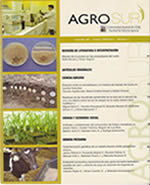Mechanical behavior of a Mollisol from central Chile depending on its structural quality
Main Article Content
Abstract
In order to assess the mechanical behaviour of a soil depending on its structural quality, a Mollisol (Maipo Serie) managed with conventional tillage (LC) and meadow (P) was ploughed with a disc harrow, followed by three tractor passes over the same path. Soil samples were taken at two depths (0-20 cm and 30-50 cm) in the initial condition, after ploughing, and after the first and third tractor passes. Penetration resistance was also measured at these moments. We measured bulk density (Db), pore size distribution and consolidation test, the last one performed at two water contents (air-dry and water tension of 60 hPa) determining the deformation, recovery and bearing capacity. After ploughing, Db in P site decreased from 1.44 to 1.06 Mg m-3, and subsequent transits unchanged this value, while in the LC site, tillage caused a decrease of Db from 1.44 to 1.23 Mg m-3. However, subsequent transits caused consolidation, increasing the Db to 1.42 Mg m-3 in the third pass. In both soils, the coarse porosity initially increased by tillage, however, this fraction decreased with the subsequent transits in the LC site, including the 30-50 cm depth. The mechanical strength was high in both sites; the highest value was reached in LC post tillage and traffic (7 MPa). The predominance of coarse porosity in P site, determined greater sensitivity to loads and lower bearing capacity, however, the recovery was higher than in the LC site. In conclusion, the LC site showed a higher mechanical strength, but its physical properties determine a low quality for crop production.

